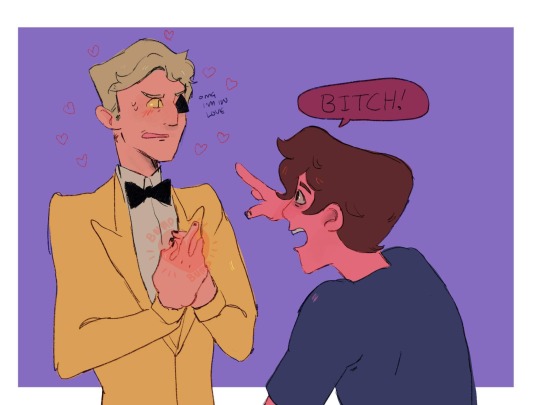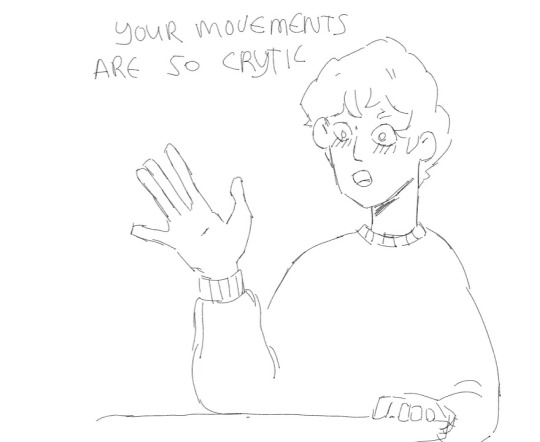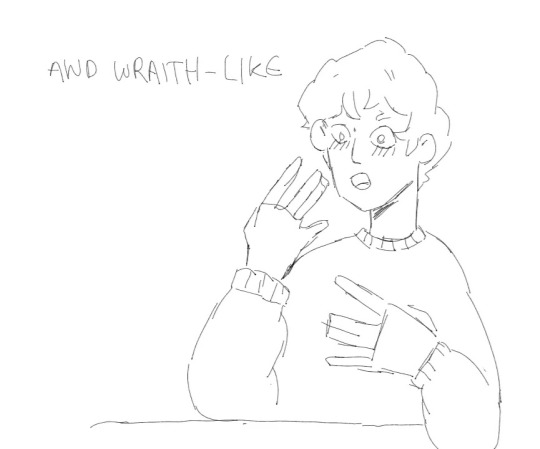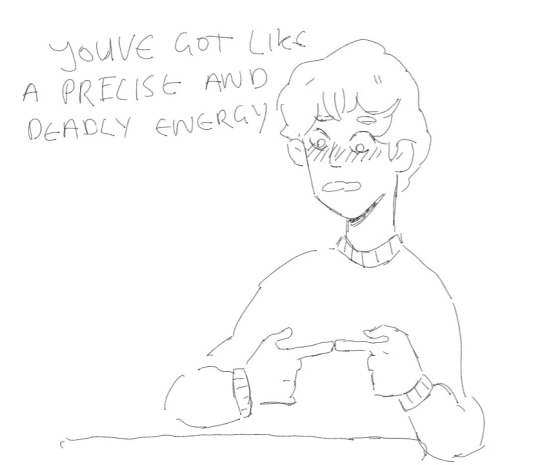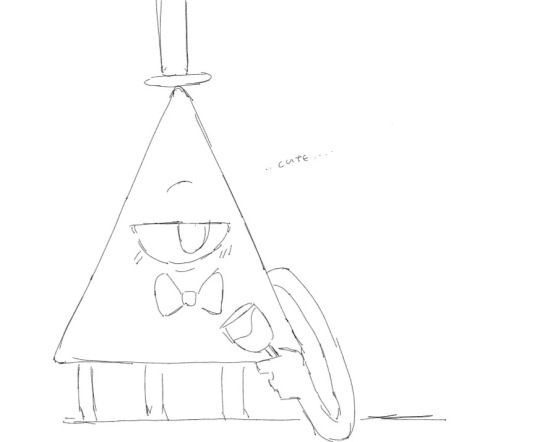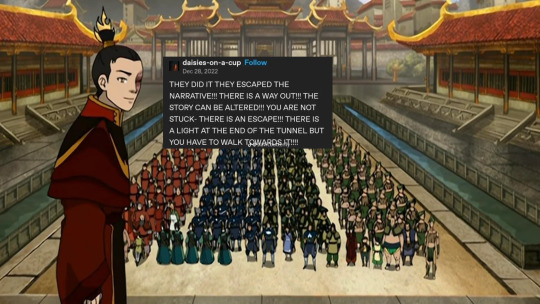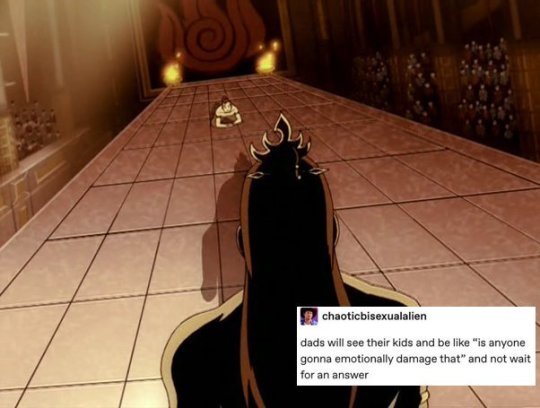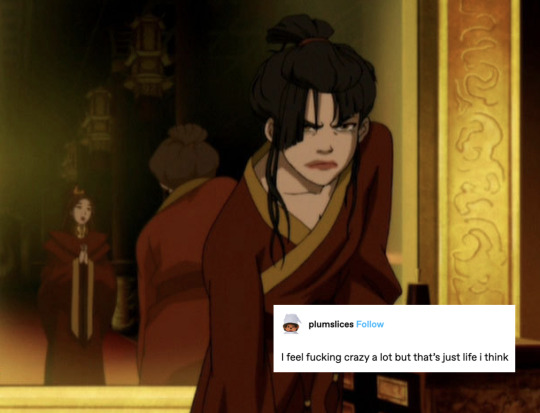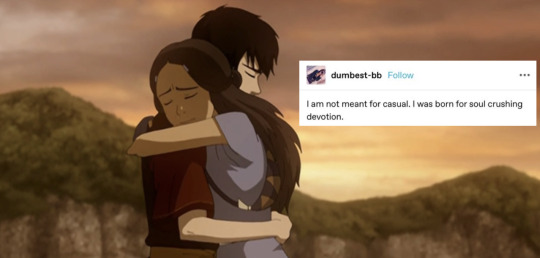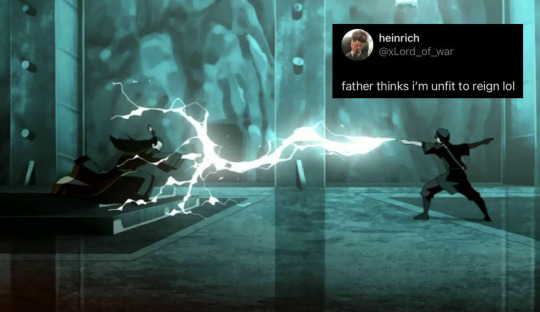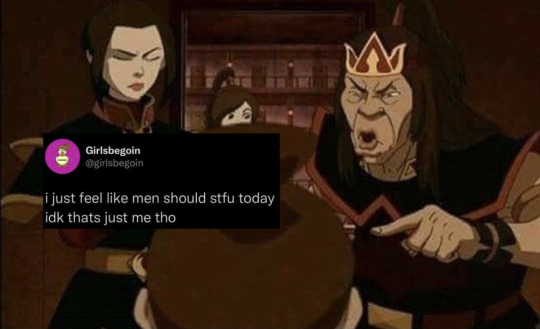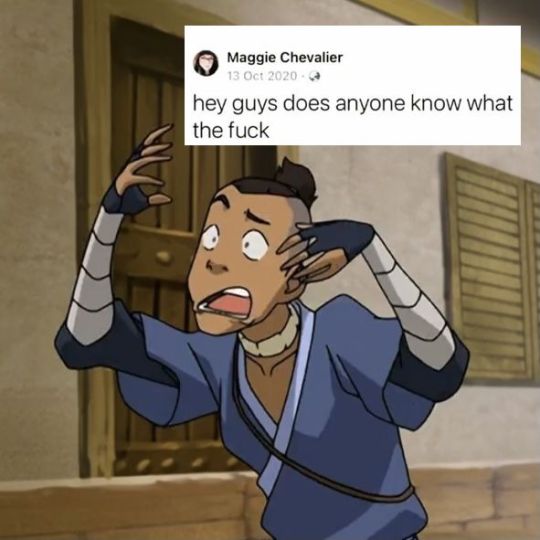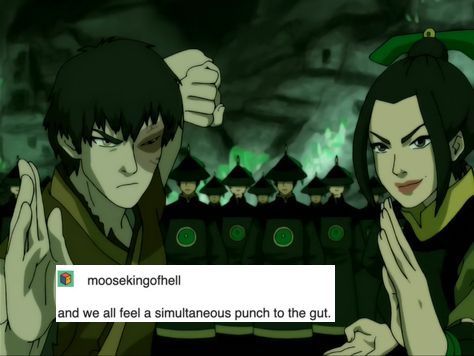Text
I’ve seen a few K@taang fans say that Aang telling Katara to forgive Yon Rha in The Southern Raiders is a parallel to Katara helping Aang leave the Avatar State. I really don’t like this take, for a simple reason:
The Avatar State is a supernatural uncontrollable rage. Katara’s anger is not.
On multiple occasions, Aang states that he regrets his actions while in the Avatar state, and he doesn’t like feeling out of control in that way. We even see his rational spirit’s reaction to the Avatar State when it detaches from Aang’s body to speak to Roku in “The Avatar State”.
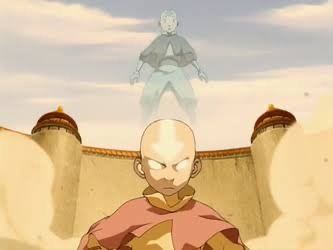
Aang wants to be stopped when he is in this state. When Katara reaches out to him, she is not trying to change his mind, she is trying to allow his rational mind to regain control. She is giving him agency, not denying him agency.
By contrast, while Katara is angry in The Southern Raiders, we’re never told that her rational faculties aren’t still operational. She’s determined. Not possessed.
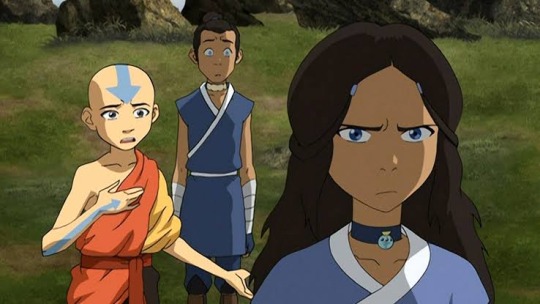
At no point does Katara say that she regrets acting in anger. Instead, we see her exercise judgement and mercy even when face to face with the man she saw kill her mother.
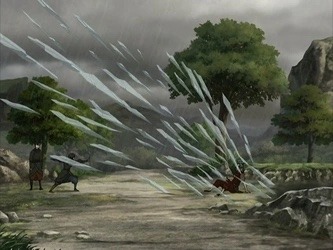
This is not someone who is out of control.
(Not that she necessarily would have been out of control if she did kill him.)
The fact that Katara wasn’t out of control and didn’t need to be stopped is further reinforced by the fact that, unlike Aang who agonises over his actions in the Avatar State after the fact, Katara doesn’t express regret at her actions or relief that she didn’t kill Yon Rha. Instead she re-states her initial position that she will not forgive him.
All of this makes Katara’s anger at Yon Rha very different from the Avatar State. She is in control of her actions and does not want or need to be stopped. Trying to stop her isn’t helping to reassert her own control over her actions, it’s questioning her active decisions. It’s denying her agency instead of enabling it.
An emotional woman is not the same thing as an irrational or out of control one.
229 notes
·
View notes
Text
MomTara and DadKo AU
Zuko and Katara are the parents who raise the brainiac dorkish teenager (Sokka) and deal with all of his know-it-all shenanigans. Katara teaches him to do proper laundry and house-cleaning, and slowly learns to give him space. Zuko teaches him how to make tea and about basic yard work and tying a tie. Zuko helps Sokka how to master breakfast, Katara, dinners. Zuko also teaches him about being a man, about being vulnerable and being careful of pride. They both find absolute revelry in watching Sokka get his heart stolen by a cheeky, street-smart classmate (Suki), and she becomes practically a part of the family by how often she stops by their house for family dinners.
They are the parents who take their time to learn and appreciate parenthood with Sokka for a few years before finally trying for another kid, this time a free-spirited and laughing little boy with a soft spot for animals and nature. It’s because of Aang that Zuko and Katara convince themselves that a dog would be a fun addition to the family – especially with the age-gap between Aang and Sokka – and so they adopt a big, shaggy dog named Appa. Katara takes to handling Appa a lot more naturally than Zuko, but the two of them build a relationship with this dog in their own, special way.
They are the parents who, after seeing Appa and Aang and Sokka get along so swimmingly as a team, are completely surprised when Katara announces she is pregnant again, and Zuko is supportive with this unexpected third child. They’re the parents who hold each other when realizing that this little girl was born smaller than average, the parents who hold hands tightly in the NICU unit as the doctor informs them that the little girl has a visual impairment, the word “permanent” echoing along the walls. When the doctor informs them of the kind of lifestyle that this would involve, Katara nods in understanding, tears welling in her eyes, and Zuko rubs her back, absentmindedly, acknowledging that fear hidden underneath her layers and layers of strength.
When they bring their daughter (Toph) home, Zuko and Katara are the parents who already have their home prepared for this little girl’s condition… who revel in watching Sokka play the third-parent to his spunky, laughing baby sister… who adore watching Aang approach the baby fondly with his big toddler eyes, watching Appa snuggle next to the girl protectively, no differently than how he was with Aang. It’s not a year later when a stray cat shows up at their front porch (Momo), and seeing the little creature purr next to Toph and watching the little girl perk up curiously and endearingly… there’s no denying that this cat has now become a part of the family too.
Zuko and Katara savor the moments they have with their very large, somewhat odd family. They are the parents who make sure Appa and Momo have their food bowls filled at night, who say “I love you” to Sokka before he rushes up the stairs with his face scrunched with Ooogies, who tuck Aang in with a stuffed animal and funny story about dragons, who brush Toph’s hair as they hum her to sleep in her crib and remind her that she is strong and amazing and someday will change the world.
And before the night is over, Zuko and Katara are the parents who find the time to hang out in the living room and drink some tea, reflecting on the day’s events and the things that might come up in the near or far future with their kids, their pets, and each other. They lean into each other sweetly and just smile to themselves as they watch whatever late-night program is on TV… and Zuko sweetly brings his lips to kiss Katara’s head rasping “good job, Mom.” She chuckles, kissing his scarred cheek soon after that with “you too, Dad.”
They hold hands on the couch and cuddle with their tea.
51 notes
·
View notes
Text
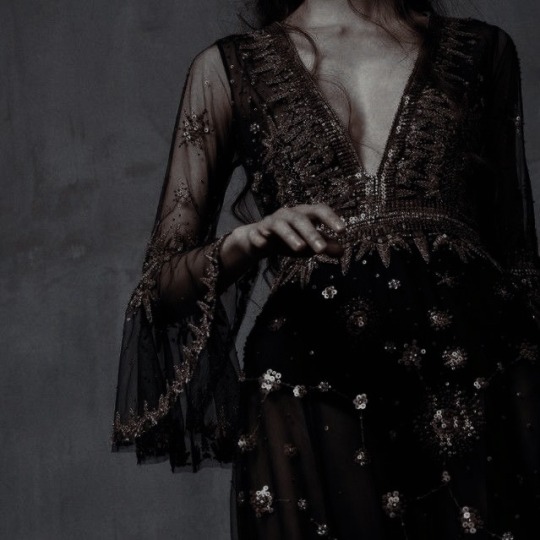
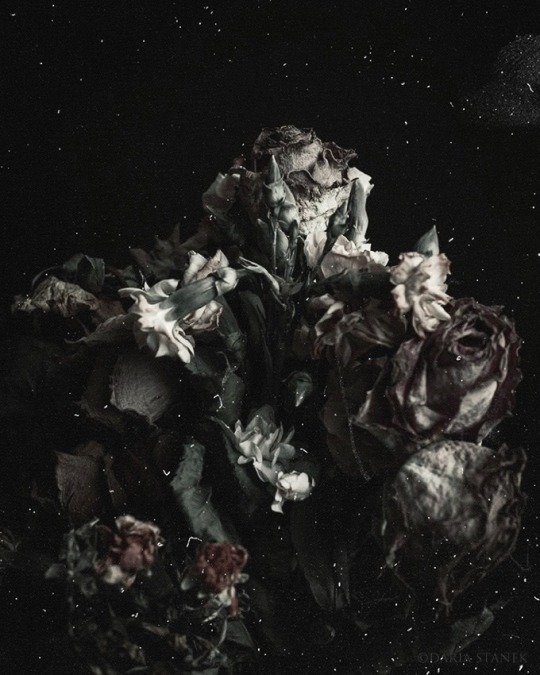




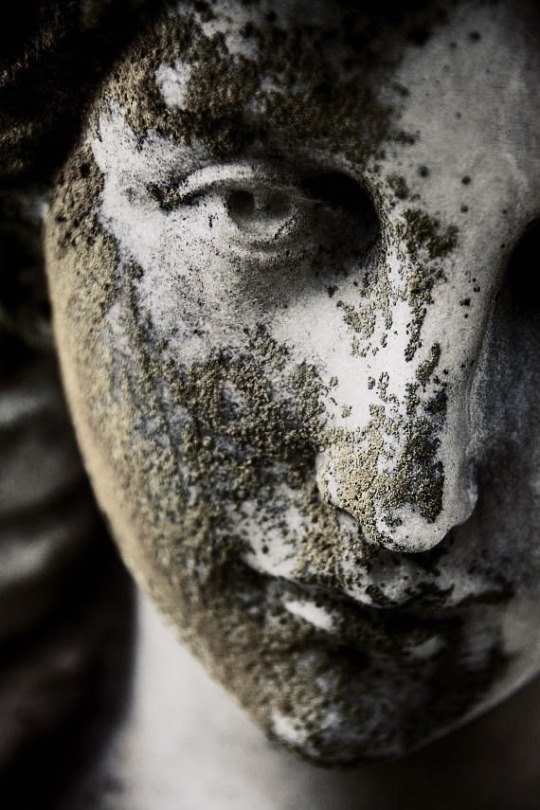
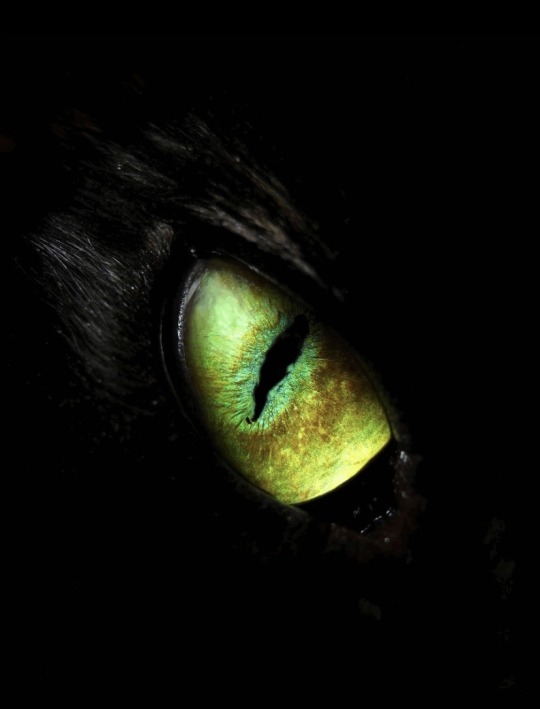

D𝚎𝚖𝚎𝚝𝚎𝚛 𝚜𝚙𝚘𝚔𝚎 𝚒𝚗 𝚖𝚘𝚗𝚘𝚝𝚘𝚗𝚘𝚞𝚜 𝚍𝚒𝚜𝚐𝚞𝚜𝚝,
"B𝚛𝚘𝚝𝚑𝚎𝚛𝚜 𝚠𝚘𝚞𝚕𝚍𝚗'𝚝… 𝚝𝚊𝚔��� 𝚝𝚑𝚎𝚒𝚛 𝚜𝚒𝚜𝚝𝚎𝚛 𝚋𝚢 𝚏𝚘𝚛𝚌𝚎 𝚊𝚗𝚍 𝚍𝚎𝚌𝚎𝚒𝚝… 𝚜𝚙𝚒𝚕𝚕 𝚝𝚑𝚎𝚒𝚛 𝚠𝚛𝚎𝚝𝚌𝚑𝚎𝚍 𝚜𝚎𝚎𝚍𝚜 𝚊𝚜 𝚍𝚘𝚎𝚜 𝚊 𝚋𝚎𝚊𝚜𝚝 𝚊𝚗𝚍 𝚜𝚑𝚛𝚞𝚐 𝚊𝚝 𝚝𝚑𝚎 𝚏𝚛𝚞𝚒𝚝 𝚒𝚝 𝚋𝚘𝚛𝚎. B𝚛𝚘𝚝𝚑𝚎𝚛𝚜 𝚠𝚘𝚗'𝚝 𝚠𝚑𝚒𝚜𝚙𝚎𝚛 𝚒𝚗 𝚙𝚛𝚒𝚟𝚊𝚝𝚎 𝚝𝚘 𝚜𝚝𝚎𝚊𝚕 𝚘𝚏𝚏 𝚝𝚑𝚎𝚒𝚛 𝚜𝚒𝚜𝚝𝚎𝚛'𝚜 𝚌𝚑𝚒𝚕𝚍 𝚏𝚘𝚛 𝚊 𝚠𝚒𝚏𝚎—"
A𝚛𝚎𝚜 𝚌𝚘𝚞𝚕𝚍 𝚑𝚎𝚊𝚛 𝚝𝚑𝚎 𝚑𝚊𝚛𝚍𝚎𝚗𝚎𝚍 𝚝𝚛𝚎𝚖𝚋𝚕𝚒𝚗𝚐 𝚊𝚝 𝚝𝚑𝚎 𝚎𝚍𝚐𝚎 𝚘𝚏 𝚑𝚎𝚛 𝚋𝚛𝚎𝚊𝚝𝚑, 𝚊 𝚌𝚞𝚕𝚖𝚒𝚗𝚊𝚝𝚎𝚍 𝚙𝚊𝚒𝚗 𝚝𝚑𝚊𝚝 𝚜𝚎𝚊𝚛𝚎𝚍 𝚝𝚑𝚎 𝚎𝚊𝚛𝚜.
“B𝚛𝚘𝚝𝚑𝚎𝚛𝚜 𝚠𝚘𝚗'𝚝 𝚒𝚗𝚏𝚕𝚒𝚌𝚝 𝚒𝚗 𝚝𝚑𝚎𝚒𝚛 𝚌𝚑𝚒𝚕𝚍𝚛𝚎𝚗 𝚝𝚑𝚎 𝚜𝚊𝚖𝚎 𝚍𝚒𝚜𝚐𝚛𝚊𝚌𝚎 𝚝𝚑𝚎𝚢 𝚙𝚕𝚊𝚐𝚞𝚎𝚍 𝚝𝚑𝚎𝚒𝚛 𝚜𝚒𝚜𝚝𝚎𝚛… 𝚝𝚑𝚎𝚢 𝚠𝚘𝚗'𝚝 𝚌𝚞𝚛𝚕 𝚝𝚑𝚎𝚒𝚛 𝚝𝚘𝚗𝚐𝚞𝚎𝚜 𝚠𝚊𝚝𝚌𝚑𝚒𝚗𝚐 𝚊 𝚍𝚒𝚜𝚝𝚛𝚊𝚞𝚐𝚑𝚝 𝚖𝚘𝚝𝚑𝚎𝚛 𝚝𝚛𝚊𝚟𝚎𝚕𝚒𝚗𝚐 𝚝𝚑𝚎 𝚎𝚍𝚐𝚎 𝚘𝚏 𝚝𝚑𝚎 𝚠𝚘𝚛𝚕𝚍 𝚏𝚘𝚛 𝚗𝚘𝚝𝚑𝚒𝚗𝚐."
Dances with the Vulture c. 28/40
A/N Demeter characterization—
The goddess is a sweetheart, no doubt. She would always be representative of the lovelier side of divine motherhood (to the extent of my readings, of course). She is, to me however, a terrifying force accumulated from sheer disgust of machismo.
While contemporary reimaginings often antagonize her in support of HadesxPersephone, I take her from the perspective of a woman who herself was a victim of r*pe. What tier of love it must be to accept wholeheartedly a daughter borne from malice?
And only later on be swindled by her brothers, her family. She searches for her daughter and they knew where the girl was kept. What twisted mind does that?
My take on her is dark, for sure. But there’s more to this antagonism that meets the eye, more than a nuisance to her daughter’s “happy marriage,” more than mere sulking.
With powers unleashed, she could be one of Olympus’ most terrifying nightmares.
photos from Pinterest
23 notes
·
View notes
Note
What if great Axolotl would give Bill and Dipper Blesing on they wedding?
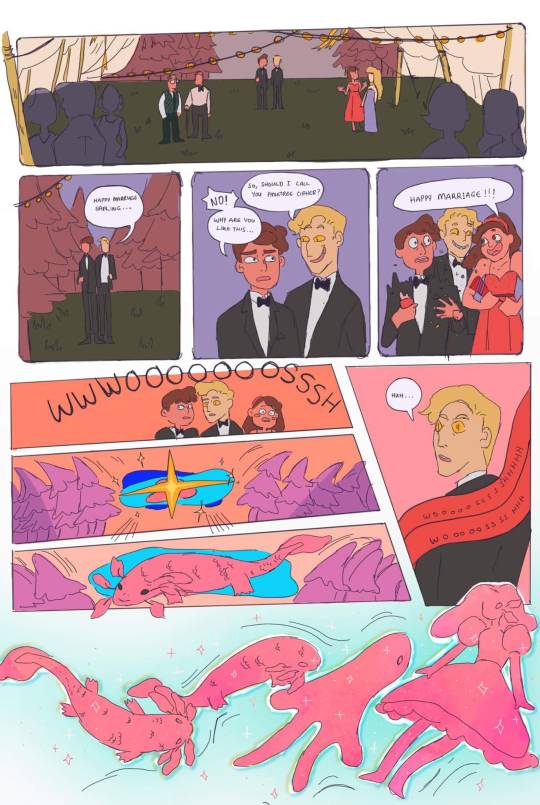

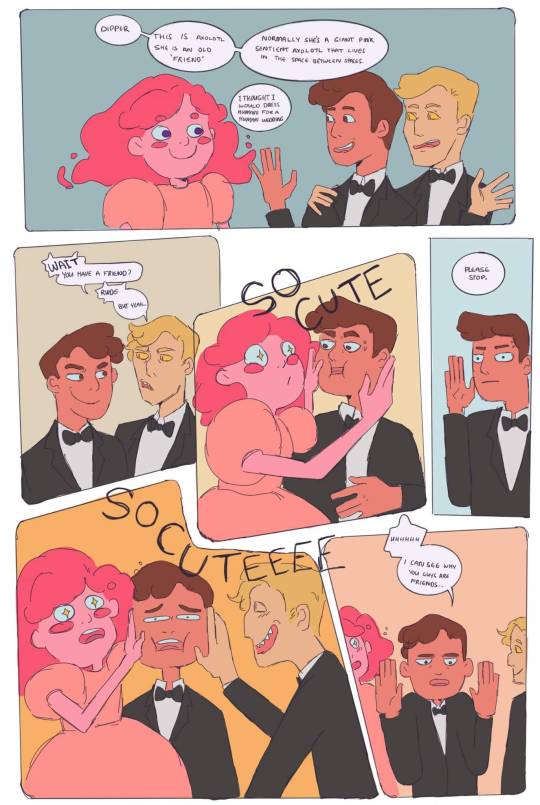
Maybe one day I'll continue this...
404 notes
·
View notes
Text
I really like this little Zutara crumb from the very end of the Sun Warriors episode…
At first, Zuko is angry and irritated because everyone is making fun of the new firebending forms. Just contrast:
Zuko @ Sokka: 😡

Zuko @ Katara: 🥺

The way his face instantly softens when she starts talking means so much to me. She’s also making fun of him. His whole demeanor changes as soon as she starts speaking. It’s literally just the sound of her voice talking to him that makes him soften up.
1K notes
·
View notes
Text
its so funny how katara stays being the only person zuko doesn't yell at when they're rightfully mad at him.
zuko with everyone: 🤬😤😡🙄
zuko with katara: im sorry 🥺 thats something we have in common 😔 what can i do to make it up to you queen i waited outside your tent all night 😕
2K notes
·
View notes
Text
zuko and katara’s narrative symmetry drives me insane every time i think about it, actually. you rise with the moon, i rise with the sun; her power waning as his grows, and vice versa. zuko becoming disillusioned with the fire nation as katara learns the truth about the evil that exists within the other nations. how they both orbit around the avatar, the emblem of all their hopes; katara pulling aang forward to his destiny while zuko pursues on the other end, driving him onwards. the way their parallel lines intersect at the end of every season before diverging once more, each one only able to rise when the other falls. circling one another, so close yet so far, until they finally come together in the agni kai, two halves becoming whole at the crux of their individual arcs and their journey together — balance forged in sacrifice, an eternal push and pull finally brought to stillness. and all of this beautifully personifying the show’s most fundamental themes in the process. how the fuck were they not canon.
3K notes
·
View notes
Text
it is a little funny, a little ironic, because as much as the Ember Island Players episode wants to be like "see?? you're silly for thinking zuko and katara's dynamic is romantic" it doesn't quite think through the in-world implications of the play because, conceivably, this play is built largely upon rumor, right? biased or purposefully distorted first, second, or third-hand accounts of the gaang and their journey? (and then of course, whatever artistic liberties the play writers want to take)
Because that all begs the question - why do the play writers think zuko and katara are together?? Like literally lmao was it just for the Drama of it all? Or do enough people in the avatar universe perceive Zuko and Katara to be a couple for it to be a far spread rumor?? Is June gossiping in taverns like "oh the fire nation prince? yeah he hired me to find his girlfriend. he had her betrothal necklace and everything"??
And how did the play writers (or anyone for that matter) even know that Zuko and Katara had shared a Moment with one another in the crystal caverns? Were there like, Dai Li Agents spying on them from afar? Watching katara huff and stalk around and yell at zuko then like five seconds later they see her cradling Zuko's face and they're just like "bro" "bro" "no way" "there's no war in ba sing se but we've got to tell people about that."
Then isn't it also implied this play is fairly popular in the fire nation? Like how many years after the war is the average fire nation citizen convinced that Zuko and Katara are an item?
3K notes
·
View notes
Text
Katara's Story Is A Tragedy and It's Not An Accident
I was a teenaged girl when Avatar: The Last Airbender aired on Nickelodeon—the group that the show’s creators unintentionally hit while they were aiming for the younger, maler demographic. Nevermind that we’re the reason the show’s popularity caught fire and has endured for two decades; we weren’t the audience Mike and Bryan wanted. And by golly, were they going to make sure we knew it. They’ve been making sure we know it with every snide comment and addendum they’ve made to the story for the last twenty years.
For many of us girls who were raised in the nineties and aughts, Katara was a breath of fresh air—a rare opportunity in a media market saturated with boys having grand adventures to see a young woman having her own adventure and expressing the same fears and frustrations we were often made to feel.
We were told that we could be anything we wanted to be. That we were strong and smart and brimming with potential. That we were just as capable as the boys. That we were our brothers’ equals. But we were also told to wash dishes and fold laundry and tidy around the house while our brothers played outside. We were ignored when our male classmates picked teams for kickball and told to go play with the girls on the swings—the same girls we were taught to deride if we wanted to be taken seriously. We were lectured for the same immaturity that was expected of boys our age and older, and we were told to do better while also being told, “Boys will be boys.” Despite all the platitudes about equality and power, we saw our mothers straining under the weight of carrying both full-time careers and unequally divided family responsibilities. We sensed that we were being groomed for the same future.
And we saw ourselves in Katara.
Katara begins as a parentified teenaged girl: forced to take on responsibility for the daily care of people around her—including male figures who are capable of looking after themselves but are allowed to be immature enough to foist such labor onto her. She does thankless work for people who take her contributions for granted. She’s belittled by people who love her, but don’t understand her. She’s isolated from the world and denied opportunities to improve her talents. She's told what emotions she's allowed to feel and when to feel them. In essence, she was living our real-world fear: being trapped in someone else’s narrow, stultifying definition of femininity and motherhood.
Then we watched Katara go through an incredible journey of self-determination and empowerment. Katara goes from being a powerless, fearful victim to being a protector, healer, advocate, and liberator to others who can’t do those things for themselves (a much truer and more fulfilling definition of nurturing and motherhood). It’s necessary in Katara’s growth cycle that she does this for others first because that is the realm she knows. She is given increasingly significant opportunities to speak up and fight on behalf of others, and that allows her to build those advocacy muscles gradually. But she still holds back her own emotional pain because everyone that she attempts to express such things to proves they either don't want to deal with it or they only want to manipulate her feelings for their own purposes.
Katara continues to do much of the work we think of as traditionally maternal on behalf of her friends and family over the course of the story, but we do see that scale gradually shift. Sokka takes on more responsibility for managing the group’s supplies, and everyone helps around camp, but Katara continues to be the manager of everyone else’s emotions while simultaneously punching down her own. The scales finally seem to tip when Zuko joins the group. With Zuko, we see someone working alongside Katara doing the same tasks she is doing around camp for the first time. Zuko is also the only person who never expects anything of her and whose emotions she never has to manage because he’s actually more emotionally stable and mature than she is by that point. And then, Katara’s arc culminates in her finally getting the chance to fully seize her power, rewrite the story of the traumatic event that cast her into the role of parentified child, be her own protector, and freely express everything she’s kept locked away for the sake of letting everyone else feel comfortable around her. Then she fights alongside an equal partner she knows she can trust and depend on through the story's climax. And for the first time since her mother’s death, the girl who gives and gives and gives while getting nothing back watches someone sacrifice everything for her. But this time, she’s able to change the ending because her power is fully realized. The cycle was officially broken.
Katara’s character arc was catharsis at every step. If Katara could break the mold and recreate the ideas of womanhood and motherhood in her own image, so could we. We could be powerful. We could care for ourselves AND others when they need us—instead of caring for everyone all the time at our own expense. We could have balanced partnerships with give and take going both ways (“Tui and La, push and pull”), rather than the, “I give, they take,” model we were conditioned to expect. We could fight for and determine our own destiny—after all, wasn’t destiny a core theme of the story?
Yes. Destiny was the theme. But the lesson was that Katara didn’t get to determine hers.
After Katara achieves her victory and completes her arc, the narrative steps in and smacks her back down to where she started. For reasons that are never explained or justified, Katara rewards the hero by giving into his romantic advances even though he has invalidated her emotions, violated her boundaries, lashed out at her for slights against him she never committed, idealized a false idol of her then browbeat her when she deviated from his narrative, and forced her to carry his emotions and put herself in danger when he willingly fails to control himself—even though he never apologizes, never learns his lesson, and never shows any inclination to do better.
And do better he does not.
The more we dared to voice our own opinions on a character that was clearly meant to represent us, the more Mike and Bryan punished Katara for it.
Throughout the comics, Katara makes herself smaller and smaller and forfeits all rights to personal actualization and satisfaction in her relationship. She punches her feelings down when her partner neglects her and cries alone as he shows more affection and concern for literally every other girl’s feelings than hers. She becomes cowed by his outbursts and threats of violence. Instead of rising with the moon or resting in the warmth of the sun, she learns to stay in his shadow. She gives up her silly childish dreams of rebuilding her own dying culture’s traditions and advocating for other oppressed groups so that she can fulfill his wishes to rebuild his culture instead—by being his babymaker. Katara gave up everything she cared about and everything she fought to become for the whims of a man-child who never saw her as a person, only a possession.
Then, in her old age, we get to watch the fallout of his neglect—both toward her and her children who did not meet his expectations. By that point, the girl who would never turn her back on anyone who needed her was too far gone to even advocate for her own children in her own home. And even after he’s gone, Katara never dares to define herself again. She remains, for the next twenty-plus years of her life, nothing more than her husband's grieving widow. She was never recognized for her accomplishments, the battles she won, or the people she liberated. Even her own children and grandchildren have all but forgotten her. She ends her story exactly where it began: trapped in someone else’s narrow, stultifying definition of femininity and motherhood.
The story’s theme was destiny, remember? But this story’s target audience was little boys. Zuko gets to determine his own destiny as long as he works hard and earns it. Aang gets his destiny no matter what he does or doesn’t do to earn it. And Katara cannot change the destiny she was assigned by gender at birth, no matter how hard she fights for it or how many times over she earns it.
Katara is Winston Smith, and the year is 1984. It doesn’t matter how hard you fight or what you accomplish, little girl. Big Brother is too big, too strong, and too powerful. You will never escape. You will never be free. Your victories are meaningless. So stay in your place, do what you’re told, and cry quietly so your tears don’t bother people who matter.
I will never get over it. Because I am Katara. And so are my friends, sisters, daughters, and nieces. But I am not content to live in Bryke's world.
I will never turn my back on people who need me. Including me.
2K notes
·
View notes



